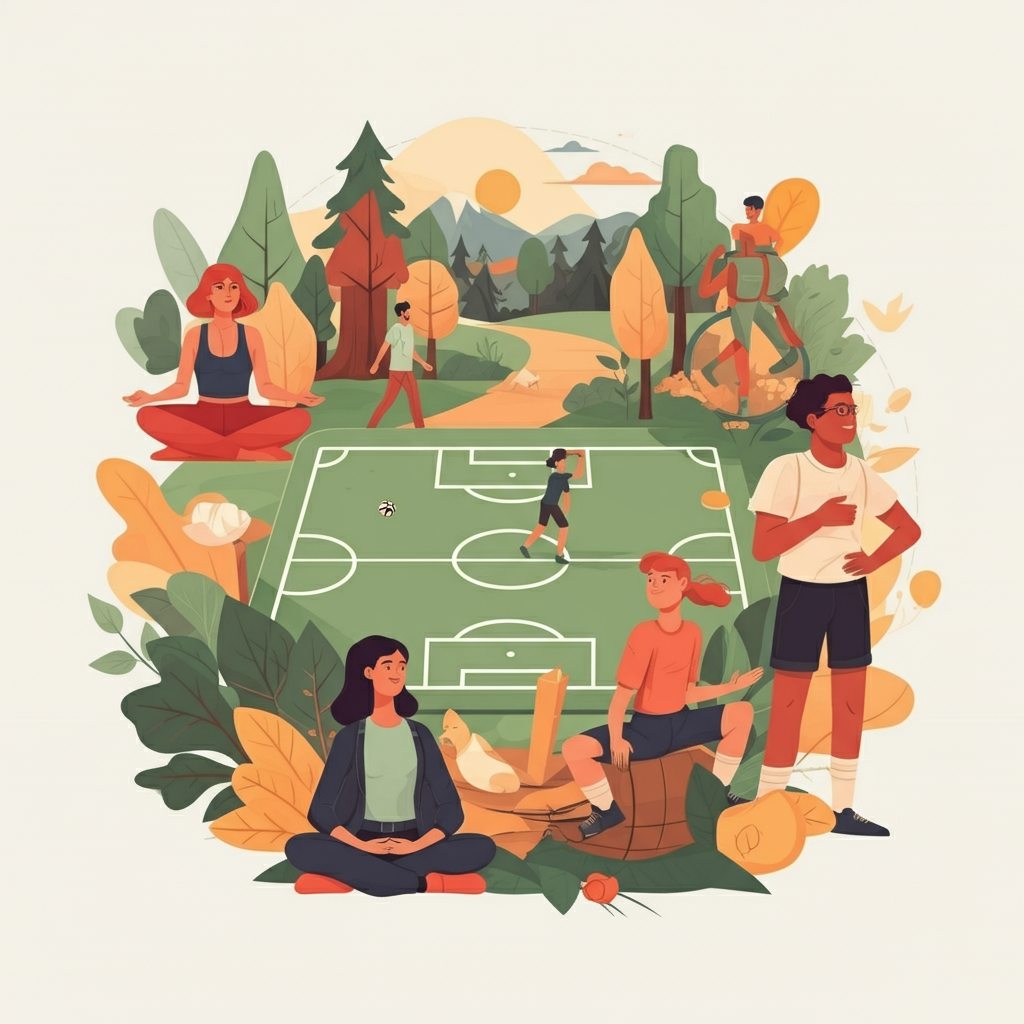With the constant demands of life, many of us struggle to find the time to unwind, stay active, and nurture our mental well-being. Enter recreational activities. Whether it’s yoga, hiking, or joining a team sport, these activities aren’t just hobbies; they hold the power to improve both mental and physical health.
This article explores the benefits of recreational activities and provides insights into how yoga, hiking, and team sports can enrich your life. If you’re ready to prioritize your well-being, read on!
What Are Recreational Activities?
Recreational activities are pursuits we engage in during leisure time, offering us a chance to relax, have fun, and recharge. These can range from sedentary hobbies, like knitting and chess, to active pursuits such as hiking and sports.
While each activity has its unique charm, active recreational activities stand out for their dual benefits to physical fitness and mental health.
Why Recreational Activities Matter
Engaging in recreational activities is more than just a way to pass the time. Studies have consistently shown their impact on improving overall quality of life. Here are some of the significant benefits they offer to your mental and physical well-being:
Mental Health Benefits
Recreational activities are a proven stress-buster, reducing cortisol levels and providing a sense of accomplishment. They help:
- Relieve anxiety and depression through the release of endorphins.
- Boost self-esteem by developing new skills or achieving milestones.
- Increase mindfulness and focus, especially through activities like yoga.
Physical Fitness
From the heart-pumping climb of a mountain trail to the agility and stamina built on the soccer field, recreational activities make staying fit enjoyable. Benefits include:
- Improved cardiovascular health and stamina.
- Better flexibility and strength through continuous activity.
- Support for maintaining a healthy weight.
Social Connection
Many recreational activities foster teamwork, support, and camaraderie. Whether you’re bonding over a soccer match or connecting with like-minded hikers, they help cultivate friendships and build a sense of community.
Creating Balance
Perhaps one of the greatest benefits is the balance that recreational activities bring. They allow you to step away from work and responsibilities, replenishing energy and offering a fresh perspective.
Three Recreational Activities to Enrich Your Life
Among the vast options for recreational activities, yoga, hiking, and team sports stand out as some of the most impactful for both mental and physical health. Here’s how each can benefit you:
1. Yoga
What It Is
Yoga is a holistic practice that combines physical postures, breathing techniques, and meditation. Its accessibility means it can be practiced alone, in a class, or even virtually.
Benefits
- Enhances strength, balance, and flexibility.
- Reduces stress and promotes mindfulness.
- Improves respiratory health and lowers blood pressure.
- Boosts mental clarity and emotional resilience.
Getting Started
Begin with beginner-friendly poses (like downward dog and child’s pose) or follow a guided class online. Pro tip: Dedicate just 15 minutes a day to see long-term benefits.
2. Hiking
What It Is
Hiking involves walking trails in natural outdoor settings, often with varying degrees of elevation and terrain. It’s not just a workout; it’s also a retreat into the serenity of nature.
Benefits
- Improves cardiovascular health while engaging large muscle groups.
- Strengthens lower body muscles and core stability.
- Reduces stress and increases focus with the calming presence of nature.
- Enhances mood through exposure to fresh air and sunlight.
Getting Started
Choose beginner-friendly trails and wear comfortable shoes. Don’t forget essentials like water, sunscreen, and light snacks!
3. Team Sports
What They Are
Team sports like soccer, basketball, and volleyball are group-based activities that blend physical exertion with strategic thinking and collaboration.
Benefits
- Boosts physical endurance and agility.
- Fosters teamwork, communication, and leadership skills.
- Provides a competitive yet fun environment that keeps exercise engaging.
- Reduces stress through endorphin release and social connection.
Getting Started
Find local recreational leagues or join pickup games in your area. Common platforms like your community center or local parks are great places to start.
How to Incorporate Recreational Activities Into Your Life
If you’re new to recreational activities or struggling to make space for them in your busy schedule, follow these simple steps:
- Set Clear Goals
Identify why you want to start engaging in recreational activities. Is it for physical fitness? Stress relief? Social connection? Knowing your goal will help you stay motivated.
- Start Small
Begin with a manageable schedule, such as a 30-minute activity twice a week. Gradually increase the frequency and intensity of your activities.
- Explore Different Activities
Experiment with yoga, hiking, or team sports to find what resonates most with you. A mix of activities can also ensure you don’t get bored.
- Prioritize Consistency
Make recreational activities a regular part of your routine. Block time in your calendar just like you would for any other important commitment.
- Engage With a Community
Join clubs or groups that enjoy similar activities. A sense of camaraderie will keep you motivated and make the experience more enjoyable.
Final Thoughts
Recreational activities like yoga, hiking, and team sports offer more than just leisure; they provide an opportunity to improve your mental health, build physical fitness, and connect with others. Their benefits can ripple into many areas of your life, from work productivity and stress relief to enhanced relationships and personal well-being.
Start small, stay consistent, and discover the profound joy and balance that recreational activities can bring to your life. Which activity will you try first?
For more tips and resources on recreational activities or physical fitness, explore our blog further.








